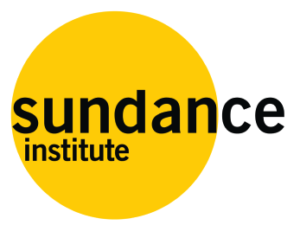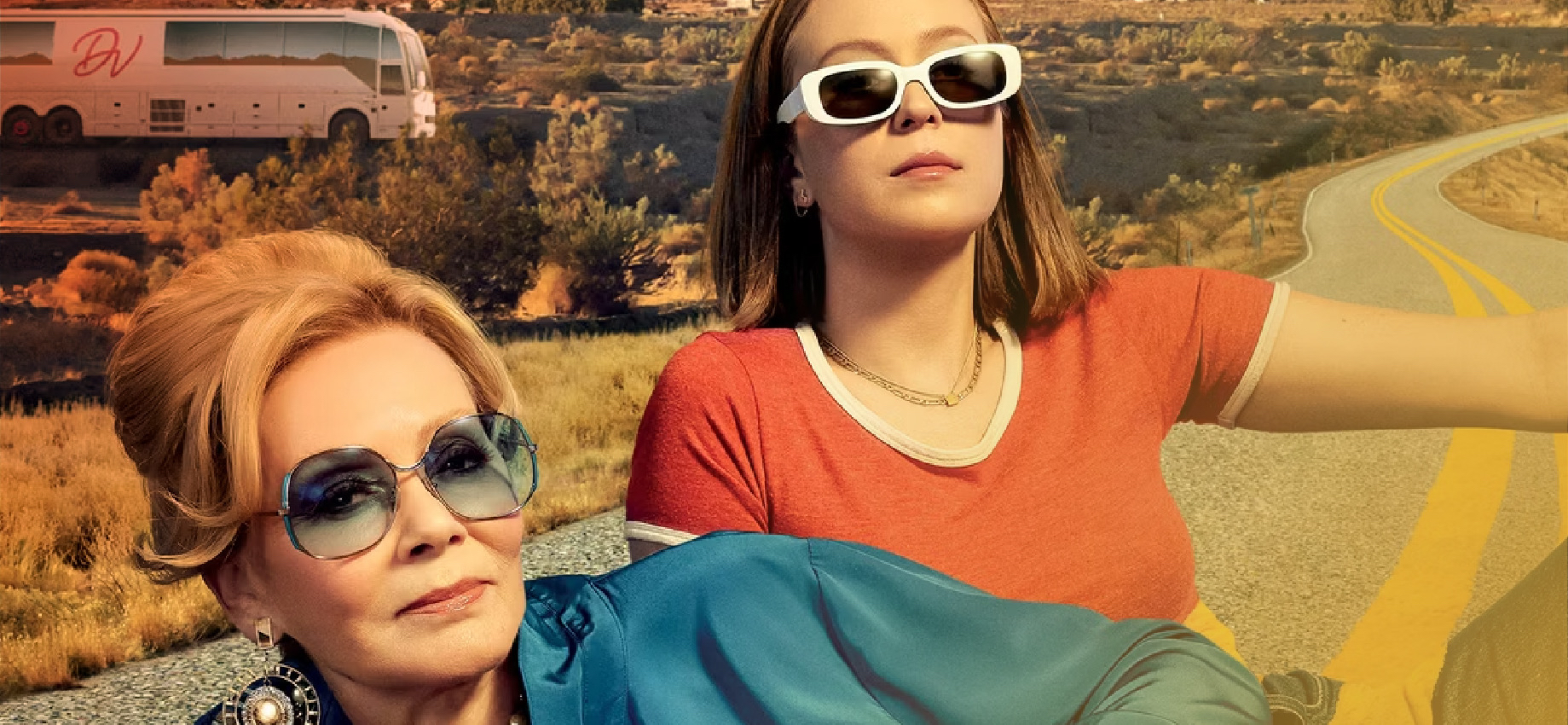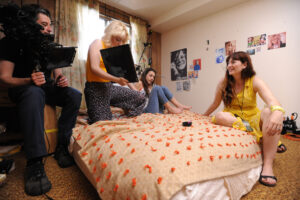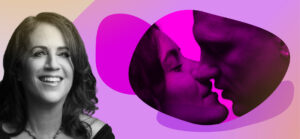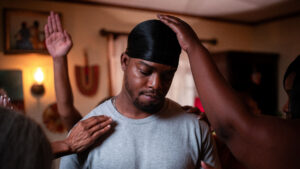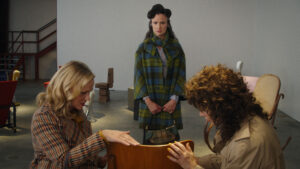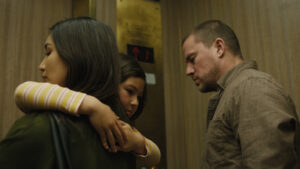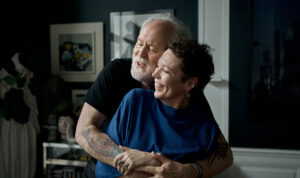By Jessica Herndon
Hacks is more than just a show — it’s a masterclass in creative collaboration, both in front of and behind the camera. The hilarious and dramatic series thrives on the chemistry between its characters, which is a result of the dynamic partnership between the creators and writers, Jen Statsky, Lucia Aniello, and Paul W. Downs. Through their shared vision, Hacks has become a multi-award-winning series, taking home both Emmy and Golden Globe awards.
Hacks revolves around Deborah Vance (Jean Smart), a legendary stand-up comedian whose long-running Las Vegas residency is at risk due to the rise of younger performers. Enter Ava (Hannah Einbinder), a disillusioned twentysomething TV writer whose last shot at success comes through a gig to modernize Deborah’s material. Over the course of four seasons, their unlikely partnership has evolved as they navigate a clash of generations and worldviews, comedic sensibilities, and codependence. As Deborah’s career has continually shifted — from a comeback comedy special to a late-night hosting gig — her relationship with Ava has followed suit, with the pair constantly redefining their dynamic. As season four comes to a close, it brings more unexpected twists. Deborah and Ava’s journey is far from over, as the show has been renewed for season five.
In a conversation with Sundance Collab at the Spotlight: Crafting Complex Characters with the Creators of Hacks event, Statsky and Aniello delve into the show’s unique approach to tone, the leads’ age gap, and socially conscious topics. To celebrate the finale of season four of Hacks, we’re highlighting key moments from the chat between these incredible writers and Sundance Collab digital course and event producer Erica Elson.
To find more on-demand recordings, head to our video library. And for the latest on our events and online courses in TV writing, screenwriting, directing, producing, and documentary filmmaking, sign up for a FREE Sundance Collab account and subscribe to our newsletter.
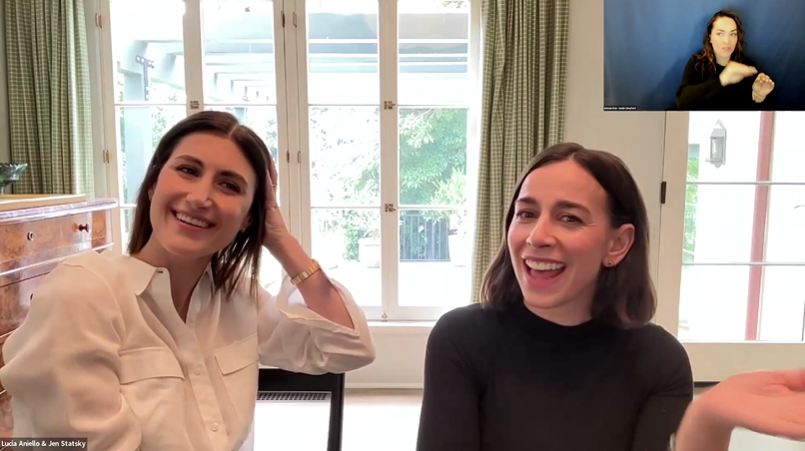
How they approach developing characters that stand out.
“In terms of crafting characters, I think you sometimes take a spark of something you have observed in real life,” says Statsky. “Maybe it’s as part of a character, you know, like the character of Deborah Vance. [She] started from a conversation about female stand-ups and comedians who we felt hadn’t gotten their due in the same way their cis male counterparts had. She’s an amalgamation of Phyllis Diller, Lucille Ball, Elaine May, and all these wonderful women.”
Adds Aniello, “A lot of the stuff we’ve done, like sometimes it’s based on real people. Sometimes, they’re like little pieces of yourself. And sometimes the actor comes in and makes [the character] their own. In terms of writing for voice, like a certain voice, we try to pitch in that person’s voice. In a way that makes it feel very specific. We used to read a lot of spec scripts, and that was always the thing that we noticed — can you feel the difference in the dialog between the characters, or does it feel like all the characters sound the same because they all sound like the author? A big thing for us is we feel like when you read the page, their dialog feels so different, whether it’s Deborah, Ava, Jimmy, Marcus, Kayla, Nina, or Mom. We really want to make sure that even on the page, it feels so specific and different. That’s something that we’re always thinking around the room.”
What the research process for the show looks like when creating each character’s authentic personality.
“We don’t really do research,” states Aniello. “I would say sometimes a random thing will happen and we’ll put it through the lens of Debra. We might borrow tiny details.” These can be details they pull from their own life, says Statsky, who adds that things her grandmother used to collect have sparked inspiration in the writer’s room. “That gives us the idea like, this would be the type of thing [Deborah would] collect,” she says.
But they don’t rely on memory alone. “We have, every season, had women — like comedians and writers — who are Deborah’s age to try to reflect that perspective because we know we’re not 72 years old, and we want to make sure we’re authentically representing that,” says Statsky.
Though the dialogue and quirks of their characters come naturally to the writers, there is one facet of Deborah’s life that they’ve needed help detailing. “The wig stuff — we have to dig deep for that,” says Aniello. Adds Statsky, “We talk to Jean’s hair people a lot about wigs. That’s a big part of making the show.”
How they balance the way Deborah and Ava lean in and out of gender norms.
“In terms of gender norms, they have slightly different experiences in terms of the time they came up,” details Aniello. “Deborah has more of an old-school perspective on it. She has more internalized misogyny. Ava has less of it. [She] still does have some of it, but I think she’s more free in a lot of ways. She’s very openly Queer, and she knows that about herself. We had them have a conversation about Deborah’s [sexual] orientation, and she’s happy to talk about it, but she hasn’t explored. Those different experiences lead to different perspectives, which they do talk about a lot.”
Statsky digs deeper, saying, “Deborah has a lot of preconceived notions like a woman can’t just come out and say what she wants. Ava doesn’t think about gender that much in that way. She is trying to free Deborah from having to think about it and be boxed in by it. But, you know, it’s something that I think feels true to us. It’s something we talked about — our careers in comedy have been affected by being women.”
Statsky remembers that when she worked as a writer on Late Night With Jimmy Fallon, she would constantly get asked on panels what it was like to be a woman in comedy. “The truthful answer is — and this is what the show is paying homage to — is the women before us worked so hard and had to deal with so much, frankly, bullshit to make it so that women my age [have a] markedly easier path. [Ava] has an easier time dealing with gender roles because of the work that women before her did.”
On the secondary characters on the show, particularly Kayla (Megan Stalter) and Jimmy (Paul W. Downs).
“Having a season where they need to really team up and get a lot done, we were like, Okay, well, what does that mean?” Aniello remembers. “What is Jimmy’s part in that? What is Kayla’s part? We wanted to say something. We do think it’s kind of true in Hollywood that sometimes really good managers are the buttoned-up ones who return emails and make sure people are on. And then sometimes there are people who are nuts and weird but like weirdly bizarro geniuses. That’s who they both are as managers, and they work well together.”
When it comes to Kayla and Jimmy, Statsky says the show’s mood is always top of mind. “The tone of the show of Hacks is it’s a comedy, and we’re always first and foremost trying to make people laugh,” she says. “But we also want it to feel grounded and real. Jean and Hannah are dramatically gifted. We do some heavy stuff. So, we always want the comedy of Kayla to feel like it lives correctly in the tone and world of the show. That’s why it’s also really important to develop her as a real person and also have Jimmy’s character ground her.
How they approach balancing contradicting tones and what techniques they employ to bring that subtext to the front.
When it comes to the show’s mode, Aniello stands firm on this sentiment: “You can’t overdo a certain tone,” she says. “It gets a little bit bland. That’s the truth, whether it’s a character dynamic in a relationship or just jokes in a scene — it can’t be too repetitive.”
Statsky says one of their techniques for maintaining the show’s tone relies on Deborah and Ava’s banter. “Early on, we identified like, Well, let’s try to make it so they’re rude, but never mean. Deborah says some incredibly rude things. But there is a difference between rude and mean. Rude can be funny, and we can have fun with it. But I don’t think they’re ever being truly cruel, except in the moments where they’re very wounded and hurt and then they are awful towards each other.”
Aniello offers more detail. “It’s like when you say a joke about your friend, but your friend knows that you love them, and so they’re like, haha, that’s so true. [Deborah and Ava are] both working on their self-awareness in the show. All of our characters have a certain amount of self-awareness.”
Statsky feels that self-awareness is what makes someone a good comedian. “The best comedians are self-aware,” she says. “You can’t be a good comedian, in my opinion, without being self-aware.”
